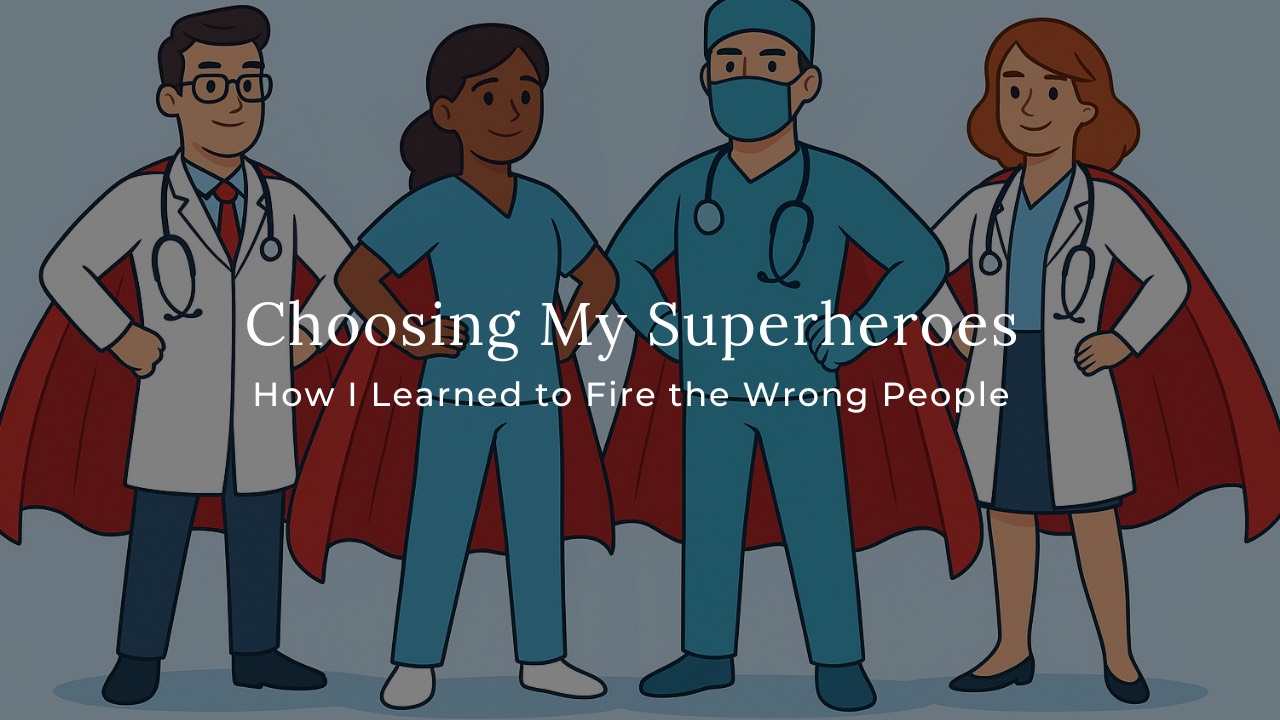
Choosing My Superheroes: How I Learned to Fire the Wrong People
When you’re diagnosed with cancer, you quickly discover it isn’t just about seeing one doctor. It’s a collaborative team effort — surgeons, oncologists, radiologists, nurses, and more. 🩺
On the surface, that sounds reassuring — a group of superheroes who have your back and want you to succeed. In many ways, it’s much like building a business team with a virtual assistant, accountant, or lawyer. 💼
Here’s the thing: in the healthcare system, building your team is usually a 'done‑for‑you' process. One specialist simply refers you to the next, like a word‑of‑mouth introduction that comes with a fancy letter. 😂 It’s essentially being passed onto their team — but that doesn’t necessarily mean it’s the right team for you.
Think about it like business. You wouldn’t hire someone for your company just because a colleague recommended them. You’d start with a job description, run interviews, check references, and see if they’re the right fit.
Choosing a medical team is no different. You need to know what you want and pay attention to how they show up.
But the truth is, not every team you’re connected to in business or in life is actually the right team for you. ❌
How do you know though?
The signs can be subtle at first — like little pebbles tossed your way: an explanation that doesn’t land, no time for questions, even just a look or a word. On their own they’re easy to dismiss, but as they keep coming those pebbles can pile up into boulders. 🪨 And sometimes, they make it clear: it’s time to make a change.
When I began my breast cancer adventure (with endless appointments, tests, and back‑and‑forths), I started noticing subtle signs that my ‘team’ might not be the right fit.
Little things at first — like the surgeon chatting casually with colleagues while patients waited long after their appointment times... She’s human, right? Maybe just a bad day. But then came other “pebbles”: during appointments, she was more focused on technical details of surgeries that weren’t even relevant to me.
I gave her the benefit of the doubt. I met with her several times, hoping things would improve. But instead, I found myself second‑guessing — wondering if she was the right fit, or if I was expecting too much. Was it unreasonable to want both strong technical know‑how and good communication skills? 🤔
Next up was the radiation oncologist — or as I like to call it, an unintentional job interview. Their role is essentially to figure out how best to “microwave” your body parts. She listened, had communication skills, and answered questions — winning! 🙌
When I shared my doubts about the surgeon, she excused her behaviour, saying surgeons “don’t have people skills.” That didn’t sit well with me. To me, that sounded like an excuse. Communication is a framework you can learn, not an optional skill to ignore. For me, communication isn’t negotiable. It’s part of the job description. 📋
Then came the oncologist — the drug dealer and potion creator. 💊 Their role? Managing chemotherapy and pharmaceuticals. This was where the pebble turned into a rock. Chemotherapy and long‑term drug therapy were presented as a given, with a one‑size‑fits‑all plan. When I questioned the approach, she wasn’t impressed — a bit like dealing with a cranky drug dealer, so not a winning sign... 😬
That was the moment I realised: I wasn’t being supported. These weren’t my superheroes. With this team, I would have to be Superman, Batman, and Robin all at once — as well as the patient. That wasn’t going to work. I’m not good with 'super villains', and I wanted a team who would support me to 'save the day' (which is live a long, healthy life). 🦸♀️
The pebbles didn’t need to become boulders for me.
The message was clear: this wasn’t the right team. They weren’t going to be the Robin to my Batman.
So I made the call I’d been hesitating to make: I fired them. 🔥
In business, if someone doesn’t align with your vision or values during the interview stage, you don’t invest time training them — you cut your losses. It’s the same here. Feedback matters, but only if the other person is open to receiving it. Otherwise, it’s wasted energy.
Why would I trust this medical team with my life if they weren’t willing to listen or adapt?
Saying “this isn’t working” and putting myself first was necessary — my life is at stake.
Those subtle signs matter. Trust them. Step away if you need The right team — the one that truly supports you — is out there. 🌟
This lesson goes far beyond medicine. Whether it’s healthcare, business, family or any other part of your life — you don’t have to stay with the team you were given. You have a choice. ✅
It’s perfectly okay to interview people and decide not to continue the superhero adventure with them, especially if they’re not open to feedback or growth.
So… who did make it onto my true superhero team? 😂 That’s a story for part two.

